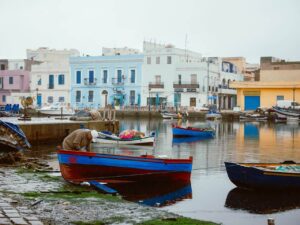Safe travel is a crucial aspect for anyone traveling or living in a foreign country. In many nations, the perception of safety can vary greatly depending on the region and the socio-economic context. For example, in some urban areas, the presence of law enforcement can be more visible and reassuring, while in other zones, the lack of safety can be tangible.
It is essential to gather information about local conditions by consulting reliable sources such as government websites or accounts from other travelers. Furthermore, it is important to take preventive measures to ensure your personal safety. This includes avoiding showing off valuables, such as expensive jewelry or electronic devices, and maintaining a low profile in potentially risky situations.
Situational awareness is essential: paying attention to your surroundings and the people around you can make a difference in dangerous situations. Lastly, having an emergency plan that includes useful contacts and safe locations is a wise strategy to handle unexpected events.
Summary
- Always be aware of your personal safety, especially in crowded and poorly lit areas
- Stay informed about the political and social climate of the destination to avoid tense situations or protests
- Check the health conditions of the place and take necessary precautions such as vaccinations or medical insurance
- Learn about transportation options and local traffic conditions to avoid inconveniences or delays
- Pay attention to crime and urban safety, avoid dangerous areas and take precautions with personal belongings
To travel safely, stay informed about the political and social climate
The political and social climate of a country can greatly affect the experience of visitors or residents. In some nations, political stability is ensured by solid governments and functioning democratic institutions, while in others, political tensions may lead to conflict or violent demonstrations. It is essential to monitor local and international news to understand the current political context.
For instance, countries like Sweden or Canada are known for their political stability and respect for human rights, making them safe destinations for travelers. On the other hand, in countries with a history of conflict or instability, such as Syria or Venezuela, it is crucial to exercise caution. Social tensions can manifest in various ways, from peaceful protests to violent clashes.
In such contexts, it is advisable to avoid conflict areas and follow the guidance of local authorities. Understanding social dynamics, such as economic inequalities or ethnic tensions, can provide further insight on how to navigate a potentially hostile environment.
Health conditions

Health conditions vary greatly from one country to another and can impact travelers’ well-being. Before departure, it is vital to research the healthcare services available in the chosen destination. In many developed countries, such as Germany or Japan, healthcare systems are well-structured and offer high-quality services.
However, in developing countries, access to adequate medical care may be limited. It is advisable to have health insurance that covers any medical expenses abroad and to carry a supply of essential medications. Moreover, consider necessary vaccinations before traveling.
Some countries require specific vaccines for diseases such as yellow fever or hepatitis. Seeking advice from local health authorities or consulting a travel medicine specialist can provide valuable guidance on the precautions to take. Finally, maintaining good hygiene practices, such as frequent hand washing and drinking only sealed bottled water, can help prevent illnesses during your stay.
Transport and traffic
The quality of transportation and road systems is another fundamental aspect to consider when visiting a new country. In many European nations, such as France and Italy, public transportation systems are well-developed and offer efficient options for traveling between cities and regions. High-speed trains, for instance, connect major cities quickly, making travel convenient and fast.
However, in countries with less developed infrastructure, such as some African or Asian nations, public transport may be limited or unreliable. Additionally, it is important to learn about local traffic regulations if you plan to rent a car. Traffic rules can vary significantly: in some countries people drive on the right, while in others they drive on the left.
Understanding local road laws is essential to avoid fines or accidents. Finally, using navigation apps can make moving around easier and help you get oriented in unfamiliar cities.
To travel safely, take a look at crime and urban safety
Crime is a legitimate concern for anyone traveling to a foreign country. Crime statistics can vary significantly from one city or country to another. For example, cities like Tokyo are considered among the safest in the world, with low crime rates and a strong law enforcement presence.
Conversely, metropolises like São Paulo or Mexico City may pose significant challenges in terms of urban safety. To reduce the risk of becoming a victim of crime, it’s advisable to take some practical precautions. Avoid walking alone in isolated areas at night and keep a close eye on your belongings — these are fundamental steps to ensure your safety.
Moreover, learning about areas to avoid and the safest means of transport can help minimize risks associated with urban crime.
Respect for local laws and customs
Each country has its own laws and customs that visitors must respect. Ignoring these rules can lead to serious legal consequences and embarrassing situations. For instance, in some Middle Eastern countries, consuming alcohol in public or wearing inappropriate clothing is prohibited.
It is crucial to learn about local laws before traveling and behave respectfully toward the local culture. Additionally, understanding social customs can enrich your travel experience. For example, in many Asian cultures it is customary to remove shoes before entering a home or temple.
Showing respect for local traditions not only prevents misunderstandings but also encourages positive interactions with locals. Being open and curious about other people’s customs can turn a trip into a meaningful learning opportunity.
Currency exchange and scams
Currency exchange is a practical yet crucial aspect to consider when traveling abroad. Exchange rate fluctuations can affect your travel budget and may require careful planning of expenses. It’s advisable to check current exchange rates before traveling and consider using credit cards that don’t charge high fees for international transactions.
Also, being cautious about currency exchange scams is key to protecting your money. In some tourist areas, there may be exchange offices offering seemingly favorable rates but hiding high fees or deceptive practices. Using official ATMs or recognized banking institutions to withdraw money is a safer strategy than direct exchanges with unauthorized vendors or shops.
Respect for the environment and natural resources
Environmental respect has become a central theme in today’s global debate, and travelers play an important role in promoting sustainable practices during their trips. Every year, millions of tourists visit fragile natural sites that can be damaged by excessive tourism. It’s essential to adopt responsible behaviors, such as not leaving trash in nature parks or staying on marked trails during hikes.
Additionally, supporting local economies through eco-friendly practices can help preserve natural resources. Choosing accommodations with sustainable policies or joining eco-tours are effective ways to reduce tourism’s environmental impact. Awareness of biodiversity and ecosystem conservation should guide every decision made while traveling, contributing to the preservation of natural heritage for future generations.
FAQs
What should you watch out for in Tunisia?
Tunisia is a safe country for tourists, but it’s still important to pay attention to certain aspects to ensure a pleasant and smooth trip.
What are the main safety precautions to consider in Tunisia?
Some safety precautions to consider in Tunisia include avoiding displaying signs of wealth, respecting local laws, and avoiding discussions about politics or religion with locals.
Are there any specific areas to avoid in Tunisia?
It is advisable to avoid border areas with Algeria and Libya, as well as remote and non-tourist desert areas.
How to behave respectfully towards Tunisian culture?
It is important to dress modestly and respect local traditions, such as avoiding drinking alcohol in public during Ramadan.
How to protect yourself from scams in Tunisia?
To protect yourself from scams in Tunisia, it’s advisable to be cautious when dealing with street vendors and to negotiate prices appropriately. Also, avoid accepting offers from strangers for unofficial guided tours.





